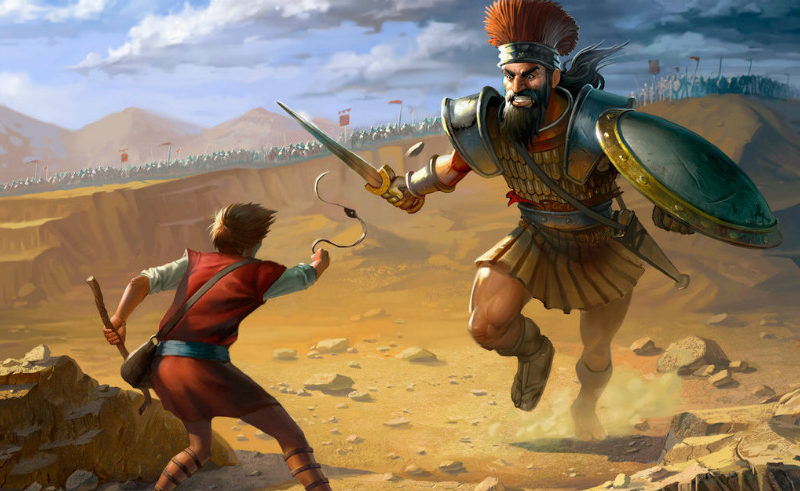Whether you're Jewish, Christian or neither, you've probably heard the Biblical story of the shepherd boy destined to become a king. David was the shepherd boy who courageously accepted the fight-to-the-death challenge from the Philistine warrior Goliath, a man twice his size. It's a classic tale of the underdog facing the champion.
If you've heard this story then you already know the outcome. If you haven't heard this story, you can probably still guess how it turned out. Our shepherd boy, armed with only a few stones and a sling, was the champion of the day when he defeated the heavily armored and weaponized giant.
According to Malcolm Gladwell, in his book David and Goliath: Underdogs, misfits, and the art of battling giants, the best way to pull off the upset is to play by a different set of rules. In other words, be unconventional.
Do we truly love underdogs?
We love any story that fits the template of this classic tale. The underdog defeats the heavily favored champion! In a 2007 study published in Personality and Social Psychology Bulletin, the researchers asked 71 participants to imagine two teams.
One was described as a strong champion, most likely to win. The other was described as the underdog. With only knowing the information of who was most favored to win, participants in the study were asked who they would rather see win. The underdog was chosen in every instance.
Or, do we just despise the most likely winners?
There's seems to be something deep inside us that makes us want to see the underdog win. Or, according to one study by the Baylor College of Medicine, maybe we like to see winners lose because we're envious of the teams that always win. This phenomena is called schadenfreude. Homer Simpson is a great example of someone who expresses this often.
Regardless of whether it's a love for the unlikely hero or a joy for seeing the champions struggle, you can't deny there's something that attracts us all to the underdog stories. Maybe it's that we can see ourselves as the underdog in these stories?
When to use this template in business
This type of story is used by leaders to inspire. When the team has to overcome tremendous odds to be successful, they need encouragement to press on. Leaders can use a David-and-Goliath story to give them hope and inspiration. If it's been done in the past, we can do it now!
I'm not suggesting you tell the actual David-and-Goliath story, but instead, use it as a template to show your audience that nothing is impossible. Show them how their current situation is not impossible. It can be overcome!
How do I pick a story?
The closer your story is in relation to the actual situation they're facing, the more impact it will have on the audience. In other words, just sharing a college basketball comeback story from March Madness may be exciting, but the audience can easily dismiss the story by saying, "Yeah, but that's basketball! This is managed IT services we're talking about here! It's not the same thing."
Try to find an underdog victory story that aligns closely with the current situation your team is facing. If it's a tough business situation where you'd like to use the story, try to find another business story similar in scope. I recommend you use Paul Smith's book on storytelling if your looking for stories you can use.
How do I structure the story?
The key to any David-and-Goliath story is to make sure your audience can see themselves as David. The audience needs to be invited into the story if you want to generate the feeling of encouragement and inspiration.
- Give the landscape and charactersfor the story and do this quickly! This should also include the obvious problem (Goliath) that seems impossible to overcome.
- Provide the thoughtsof the underdog (David) by showcasing two things:
- The underdog's awarenessof the challenge and the insurmountable odds he/she is facing.
- The hope and faith to tryanyway. This should point directly to the reason whyit is still worth pursuing.
- Describe the approach used to solve the problem. What did the underdog do to approach the problem? Remember, history has proven when the underdog wins, they tend to use unconventional methods. What is the unique approach they took?It's important that this element be something within his/her control. Do NOT let this be a product of pure luck. If it is just a lucky break, your team can easily dismiss this as a fluke which is unlikely to occur again for them.
- Describe the feeling of victoryand what it meant to the team. This is the part of the story that gives the audience the deep sense of satisfaction. It should generate the feeling of a tough victory earned by fighting unconventionally to overcome amazing odds.
It's time for you to go slay that giant and inspire your team.
Until next time,

Let's connect...
on Twitterif we haven't already?
OR Let's connect via my Facebookpage!
iSpeak teaches workshops on Professional Selling to help sales leaders gather the most important data and then use that information to create the right message. Are your sales presentations closing eyelids or deals?
Russ Peterson Jr. is the co-founder and Managing Director of iSpeak, Inc. - An award-winning professional development training company. Russ is a speaker, international trainer, and published authoron Professional Sales Communication and Business Communication. He delivers workshops, keynotes, and personal communication coaching services to business professionals in the US and around the world. His leadership blog assists leaders in giving voice to their vision. You can connect with Russ directly through Twitter, Facebook and LinkedIn.



 How do you Influence Without Authority?
How do you Influence Without Authority?